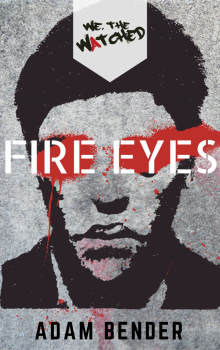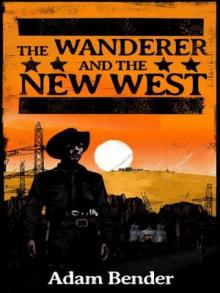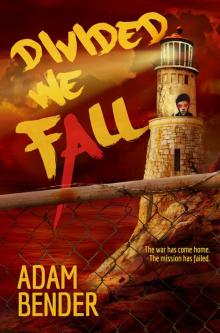- Home
- Adam Bender
The Wanderer and the New West
The Wanderer and the New West Read online
Table of Contents
Dedication
A MISSION STATEMENT FOR
THE NEW WEST
The Parishioners Are Packin’!
Was He Justified?
What’s the Angle?
Not that Nice a Train, Darling.
Gonna Get You Good.
BRECK AMMO EXPECTED TO REVEAL NEW GUN
This Gun Is a Revolution!
Let’s Round Up Some Bad Guys!
Now Ain’t that Romantic?
Sensationalist Speculation!
BRECK CONNECTED TO
RED STRIPE GANG
This … Blog …
The Wanderer and Kid Hunter!
Ain’t Safe for You Here.
Aw, Hell …
Cute.
To New Friends!
So You Reckon You’re a Real Reporter?
Ain’t You Just a Little Wanderer?
This Smells of Showboating!
El Aspecto de los Muertos.
The Hero Never Dies, Right?
A Militia!
So That’s It?
BALLAD FOR A LITTLE WANDERER
I Ain’t Nobody.
A Citizen’s Arrest.
We Need to Talk.
Rise and Shine.
You and What Army?
This Is Madness!
WANDERER BREAKS UP BRECK GUN TRADE WITH GANG
It’s Not Your House.
A Job is a Job.
Very, Very Lucky.
The Truth?
Riders!
EXCLUSIVE: THE TRUE IDENTITY OF THE WANDERER!
You’ve Still Got a Brother.
The World’s Changed.
Make Sure He’s Dead.
A GUN TO KEEP US SAFE
Battle Scars.
About the Author
WE, THE WATCHED:
A novel by Adam Bender
DIVIDED WE FALL:
A novel by Adam Bender
Copyright
Dedication
* * *
Dedicated to Gary Zingher for igniting my fervor for action-adventures stories and for encouraging me to spin exciting tales of my own.
Special thanks to my spectacular wife Mallika, who happily reads my unpublished manuscripts and always gives her most honest opinions.
* * *
A MISSION STATEMENT FOR
THE NEW WEST
By New West Reporter
We live in a time of great individual freedoms. No government can tell us how to live our lives because we are free. In America, we are above the law.
We live in a time of great violence. Rob a bank, steal from a neighbor, murder a man who looks at you funny … but do it at your own peril. The people are watching, and we know the difference between right and wrong. Stand your ground, but beware: in America, we make our own justice.
This is THE NEW WEST.
These pages chronicle a people unbound by law — their actions and the consequences. We print only the wildest truth.
CHAPTER ONE
The Parishioners Are Packin’!
The gazes of eighty-three Catholics swung from the priest to the back of the church, where a tall man in a cowboy hat stood with ready hands by his hips. He had dark brown hair and a stubbly chin speckled with salt, but he wore his wide-brimmed hat low and it was hard to make out his features.
Father James Hopkins broke from his sermon and gave the stranger a cold stare. The unknown man gasped somewhat sarcastically and stuck up his palms over the gray Stetson. The motion of his arms lifted his leather jacket high enough to reveal two handguns holstered around his waist — a Lassiter six-shooter on the left and a semiautomatic Breck 17 on the right.
Somewhere in the pews, a small child began to cry.
“I don’t mean any trouble,” the gunman said. There was a twang to his voice reminiscent of old Western movies.
Father James stole a glance at Ben Martin, who was twisted around like everyone else for a view of the stranger. The back of the sheriff’s neck looked nearly as red as his plaid shirt, contrasting strongly with the gray sticking out the back of his Army hat.
“Truly,” the gunman continued as he strode down the aisle, “I am sorry to interrupt the solemnity of this fine house of God. However, there’s a man I am looking for, and I believe he is here.”
Martin bolted upright from his pew. “Who do you think you are, coming in here and making demands?”
Father James motioned for Martin to take his seat, then held out a welcoming hand to the gunman. “My son, why don’t you join us? We can sort out whatever this is about after Mass.”
The priest could feel the sheriff’s burning glare. He tried to ignore it, tried to keep his eye contact firmly on the man with the guns.
The stranger dropped his hands and shook his head. “I ain’t your son, Father. And I’m afraid this is something that just can’t wait. See, I’m after a monster who done near took a girl’s life. Goes by the name of Tom Jenkins.”
Father James tried hard not to look at the teenager sitting in the front row, thinking it might give away the boy’s location. “Now, listen here, stranger, I won’t stand by while you make accusations against a member of our community! If he has done something wrong, by God we — and only we — will be the ones to cast judgment!”
“Beg your pardon, but I don’t trust you will.” The gunslinger leaned back on one leg and cast his smile like a dare. His right eye gleamed crimson. For an instant, Father James thought Satan himself might be in the church. Then he noticed the edge of a thin lens above the stranger’s cheek and saw what had made the red glare — an augmented-reality display.
Martin snarled, “I believe I know you, Wanderer.”
The suddenness of the conviction left Father James mute. He wasn’t the only one. The townsfolk, whose heads had been bouncing about like bobble-headed baseball stars, zeroed in on the sheriff’s lips. Over the past year, they’d all heard tales of a vigilante called the Wanderer popping up in various places around the West, performing various good deeds such as stopping robberies and dueling with members of the Red Stripe Gang. Father James had thought the Wanderer was just a legend made up to make people feel a little safer.
However, this was almost certainly not the effect the Wanderer was having on Ben Martin. The sheriff pointed accusingly at the gunslinger and sneered. “You go from town to town startin’ trouble. I heard you even set a man afire! Now you mean to start trouble right here in this holy place.” Martin stood up again, jabbing his finger harder toward the Wanderer. “Well, if it’s trouble you want, it’s trouble you’ll get.”
*
The Wanderer stroked the warm ebony handle of his Lassiter revolver as the fat man with the rusty sheriff’s badge pulled a double-barrel shotgun out from his seat. It appeared to be a six-year-old Pilgrim of the pump-action variety. Presumably, it had been kept tucked away in the back of a pew, right next to the Book of Psalms.
Neither man budged. A hushed silence filled the church. Then, one by one, the men and women around the church rose to their feet with guns of their own. The majority brandished Breck 17s.
The sudden rise to arms didn’t surprise the Wanderer in the least. He had made Liberty his home for the past week. That was long by the standards of a man who felt most comfortable when he rode the train, but the dusty hamlet had deceived him with its fresh-swept streets and baked bread aromas. Yesterday afternoon, the thought had occurred that here might be a town he could stay for good — a place to stick the screaming past in a coffin and bury it alive. But violence caught up to him, like it always did, and now he knew that the white paint on Liberty’s wooden porches merely disguised the same rot infecting the rest of America.
>
Leaving his own guns in their holsters, the Wanderer mocked, “Well, look at that! The parishioners are packin’!”
His cool disdain elicited more than a few confused looks. Finally, the sheriff stepped out into the aisle and stuck his Pilgrim smack in the Wanderer’s face. “Now, look here! The name’s Ben Martin. I’ve lived in this town for more than fifty years, been sheriff for nearly twenty, and I’ll be damned if some outsider thinks he can just come in and shoot up the church! You must be some crazy —”
The Wanderer snatched the end of the shotgun and pushed it straight up to the ceiling. “No,” he growled, “starting a gunfight in a church is crazy. In fact, if you ask your preacher, I’m sure he’d tell you it’s a downright sin.”
Taking advantage of the momentary attention, the priest called, “Everyone put down your guns! The Lord can stand his own ground!”
Martin looked as if he’d just been slapped across the face with a cold fish.
“Better do as your preacher says,” smirked the Wanderer, releasing the tip of the shotgun.
Flushing an even deeper red, the sheriff let the Pilgrim drop to the floor. With frowns of great futility, most of the other armed men and women followed — all but one shaking teenager in the front row. The Wanderer spoke a single word under his breath: “Recognize.”
Through his glass eyepiece, an electric green oval closed around the boy’s face. A few seconds later, the message ID CONFIRMED flashed onto the screen.
“So, there you are, Jenkins,” the Wanderer called, adding a friendly wave. “What say we avoid the Lord’s wrath and take this disagreement outside?”
“According to you,” said the teen, shakily raising his semiautomatic, “I’m goin’ to Hell already.”
A great boom echoed through the sanctuary, but the Wanderer slid neatly into cover behind a pew. Two more errant shots from the boy’s Breck 17 whistled in ricochet off a column behind him.
A bubble of stunned silence burst into a dissonant roar of bellows and shrieks. The Wanderer pushed aside the bottom flap of his jacket with his left hand and took out the Lassiter, but a stampede of panicked churchgoers surging up the aisle blocked his aim. Ben Martin reached down to the sacred floor for his Pilgrim, but another parishioner’s foot collided with the shotgun and sent it clattering away. The crowd pushed the whining sheriff up the aisle and out the door.
“Map,” directed the Wanderer, and a diagram of the building layout appeared in his view. He saw two exits from the sanctuary — the main entrance behind him and a fire door located near the altar, close to where Jenkins had been sitting. They were connected by a hallway forming the perimeter of the sanctuary. With the crowd surging up the aisle, the main entrance seemed the safer bet, but he still had to find a way to squeeze into the herd.
He was just about to force his way when a big man with a ponytail stopped short and used his broad shoulders to hold back the crowd. People bounced against his back and fell off like a bunch of bowling pins. With a grateful tip of the hat, the Wanderer made his escape. He ran hard down the hallway but couldn’t locate his quarry inside the church. Taking a hard right, he burst through a fire exit into white daylight.
The Wanderer caught just a glimpse of his prey shuffling toward the parking lot, but the sky burned so bright that he had to lower his hat for shade. When the sunspots finally faded, he saw Jenkins spinning around with his gun. In one swift circular motion, the Wanderer brought the silver Lassiter from his hip to point at Jenkins’s chest.
*
A flagpole hoisted Old Glory between the two red-roofed bell towers of the Church of Santa Maria. Martin was catching his breath in front of the former mission’s blue gates when two shots rang out. He waddled quickly toward the parking lot, passing Gerard Breck’s smirking headshot on a banner announcing the Breck Ammunition traveling gun show. The congregation followed closely behind.
The sheriff found the Wanderer kneeling by a red pickup truck, head down as if he was in prayer. Tom Jenkins lay dead at the gunslinger’s feet, surprise plastered on his young face.
“Everyone get back!” called Father James, circling around the herd.
Ben Martin stepped up to the preacher and pointed accusingly at the Wanderer. “He killed him! Just like that, he killed him!”
The gunman snatched the young corpse by the collar and folded him over the side of the truck’s flatbed. Martin yelled, “How can you do this? He was just a boy!”
The Wanderer didn’t even look up. “A piglet’s still a damned pig, isn’t he?”
“You’re … you’re under arrest!”
“Heh. Under whose authority?”
Martin hesitated. He didn’t have the fitness to take down a man like the Wanderer by himself. Turning around, he could see he didn’t have support from the townsfolk, either. It was like there was an electric fence preventing them from getting anywhere close to the rogue.
“It was self-defense!” shouted one of the parishioners — Martin traced the voice to Jackson Veras. “Tom shot first!”
Martin got up so close in Jackson’s face, actual droplets of spit materialized on the man’s glasses when the sheriff yelled. “Who are you? His lawyer?”
“Don’t start with me, Martin,” sneered Jackson, stabbing the sheriff with his finger. “I’ve never seen this man before, either. But you know what I did see?”
“What?”
“A cowardly sheriff pointing a shotgun, and an honorable man protecting himself.”
“An honorable man?” Martin pointed at the gunman. “Him?”
The Wanderer pushed the corpse of Tom Jenkins the rest of the way into the truck and, with the slightest of smiles, wiped the blood off his hands using a piece of the dead boy’s shirt. It was all Martin could take. The sheriff charged, but Jackson got a grip around his waist and held him back, strong and tightly.
“Come, sheriff,” wheedled Father James, approaching with one hand extended. “Come back into the church so we may finish the Mass. Let the bounty hunter finish what he —”
“Hey!” snapped the Wanderer. “I ain’t no bounty hunter!”
Everyone shut up. A hot breeze sent a cloud of dust crackling into the bumper of the parked cars.
“There’s a girl in the hospital named Sara Heller,” he continued. “She was near death last night on account of this pig Jenkins, and if she remembers anything about last night, she just might wish she was dead. Sara’s got a sister named Sharon keeping vigil by her bedside. You can ask her what Jenkins did, if you don’t believe me, but don’t forget to tell her what I done to that hog.”
He spat into the flatbed, adding a wet exclamation point to the speech. The Wanderer turned his back on the parishioners and walked toward the sun.
“Hey!” called Martin, making a renewed push against the arms of Jackson Veras. “Where do you think you’re going?”
The Wanderer took a few more steps and called back, without turning, “Wherever the track leads.”
CHAPTER TWO
Was He Justified?
Rosa hovered over the keyboard with the intensity of a bull getting ready to charge. She was working on an infographic, a map of the state of Arizona. She had geographically plotted different-sized circles to represent the number of gun deaths in the past year. They had ballooned in the two cities in the lower half of the state, which was understandable given that they were population centers. In small towns, however, the number of town deaths didn’t proportionally follow population. That was because the small towns with the biggest circles had experienced mass shootings in the last year. All involved the Yossarian assault rifle, a fully automatic weapon that could wipe out a crowd of people in under a minute. The one outlier seemed to be Union — a lot of deaths this year, but Rosa didn’t remember any major shootings reported.
She scrunched her eyes and, after a moment, snapped her fingers. Of course! The Red Stripe Gang had taken Union. It might as well be a black hole now, at least where any news was concerned.
T
he Gang had taken over several towns around the country, using them as bases after committing robberies and other crimes. The Red Stripers were named for their flag: an American flag without the blue square of stars — just thirteen red-and-white stripes. The Gang had started as a giant coalition of America’s most dangerous motorcycle gangs, loosely held together by a belief in organized greed and debauchery. They had a predilection for drugs, gambling, violence, and motorcycles. The members were predominately white men — though there were some women, too — and many had ties to the neo-Nazis and the Ku Klux Klan. The Gang also attracted closet psychopaths who’d never done a bad thing when there’d been adequate law enforcement, but who now felt free to act their true selves. The Gang was large, organized, and attracted the worst elements of America — and no one seemed to have the cojones to do anything about them.
The reporter felt least confident about her data for the mountainous regions in northern Arizona, which showed very few gun deaths. Lower population, of course, but the numbers still seemed small. She wondered if it might come down to a limitation with her data — the fact that she only had information on reported gun deaths. With fewer witnesses and a wide-open wilderness for killers to hide bodies, perhaps many casualties went unreported.
In the end, though, it didn’t really matter if she counted every single fatal shooting in the state. She had another map, exactly the same, but it was for the full year before Congress overturned the National Firearms Act and legalized sale of fully automatic rifles such as the Yossarian to consumers. There were still plenty of gun deaths, of course, but the circles looked like dots by comparison. That was the real story right there — all the deaths skyrocketing after the legalization of the fully automatic rifle.

 Invasion Day
Invasion Day Fire Eyes
Fire Eyes Life Trade
Life Trade The Wanderer and the New West
The Wanderer and the New West Divided We Fall
Divided We Fall